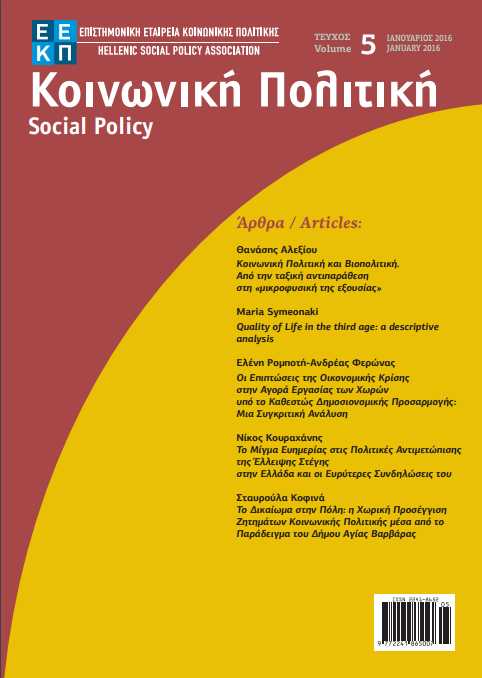Κοινωνική Πολιτική και Βιοπολιτική. Από την ταξική αντιπαράθεση στη «μικροφυσική της εξουσίας»

Abstract
After defining the content, the functions and the social-theoretical background of social policy, we indicate the epistemological and methodological parameters that frame the analytical category of biopolitics. The indication is important a) because of the increasingly use of social policy as biopolitics and b) because the essentialism of power that characterize the «paradigm” of biopolitics transfer social politics from the realm of class conflict (for rear resources and means) to the labyrinth of power relations.It is about a “paradigm” shift, as in the case of biopolitics doesn’t exist concrete social subjects, meaning social classes, neither central poles of power (state, capital, supranational institutions etc.). Class relations are more derivatives of power relations. Consequently, the indication of methodological issues that derives from the extensive use of biopolitics will highlight the analytical capability and its use in social policy’s issues.
Article Details
- How to Cite
-
Αλεξίου Θ. (2017). Κοινωνική Πολιτική και Βιοπολιτική. Από την ταξική αντιπαράθεση στη «μικροφυσική της εξουσίας». Social Policy, 5, 5–28. https://doi.org/10.12681/sp.10598
- Issue
- Vol. 5 (2015)
- Section
- Articles

This work is licensed under a Creative Commons Attribution 4.0 International License.
Authors who publish with this journal agree to the following terms:
Authors retain copyright and grant the journal right of first publication with the work simultaneously licensed under a Creative Commons Attribution Non-Commercial License that allows others to share the work with an acknowledgement of the work's authorship and initial publication in this journal.
Authors are able to enter into separate, additional contractual arrangements for the non-exclusive distribution of the journal's published version of the work (e.g. post it to an institutional repository or publish it in a book), with an acknowledgement of its initial publication in this journal.
Authors are permitted and encouraged to post their work online (preferably in institutional repositories or on their website) prior to and during the submission process, as it can lead to productive exchanges, as well as earlier and greater citation of published work.


